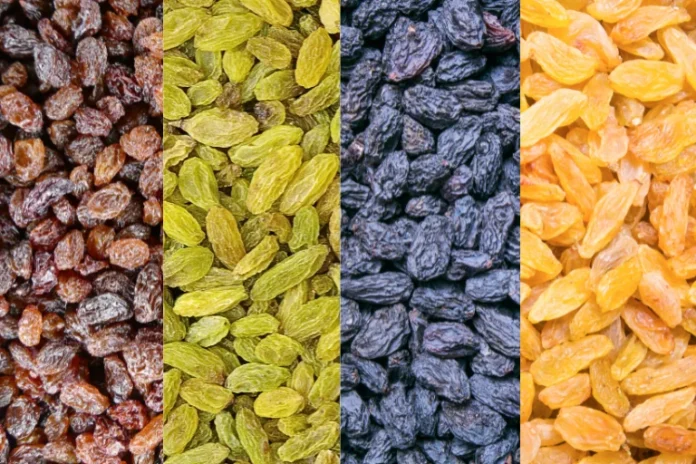A Complete Guide to Different Types of Raisins, Their Health Benefits, and the Best One to Choose
Raisins are one of the most popular dried fruits consumed worldwide. They are sweet, chewy, and packed with essential nutrients that offer numerous health benefits. Made by drying grapes, raisins come in various types based on the kind of grape used, drying methods, and their final appearance and taste. In this comprehensive guide, we’ll explore the different types of raisins, compare their health benefits, discuss which one is best for your health goals, and recommend daily intake limits.
Table of Contents
- Introduction to Raisins
- Types of Raisins
- Black Raisins
- Golden Raisins
- Green Raisins
- Red Raisins
- Currants
- Sultanas
- Nutritional Value of Raisins
- Health Benefits of Raisins
- Improve Digestion
- Boost Iron Levels
- Support Heart Health
- Aid in Weight Management
- Enhance Skin Health
- Strengthen Bones
- Support Eye Health
- Which Type of Raisin Is Best?
- Recommended Daily Intake of Raisins
- How to Include Raisins in Your Diet
- Side Effects of Overeating Raisins
- Conclusion
1. Introduction to Raisins
Raisins are dried grapes that have been used for centuries as a sweetener, snack, and ingredient in various dishes. They are rich in natural sugars like fructose and glucose, fiber, vitamins, and minerals. Depending on the type of grape and drying method, raisins can differ in taste, texture, color, and nutritional content.
2. Types of Raisins
1. Black Raisins
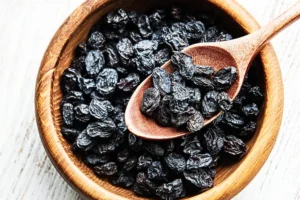
Description: Black raisins are made from seedless black grapes, often dried in the sun or in mechanical dehydrators.
Color: Dark brown to black
Flavor: Sweet with a rich grape-like flavor
Common Use: Eaten raw, added to cereals, desserts, and baked goods
Benefits:
- Rich in antioxidants
- Good for heart health
- Helps regulate blood pressure
- Promotes clear skin
2. Golden Raisins

Description: These are made from green grapes and dried using sulfur dioxide to preserve their golden color. They are usually dried in dehydrators.
Color: Golden yellow
Flavor: Milder and fruitier than black raisins
Common Use: Used in baking and gourmet dishes
Benefits:
- High in flavonoids
- Boost immunity
- Promotes healthy digestion
3. Green Raisins

Description: Made from green grapes and dried naturally, mostly used in Middle Eastern and Asian cuisines.
Color: Pale green
Flavor: Slightly sour, chewy texture
Common Use: Garnishing sweets, added to rice dishes
Benefits:
Supports eye health
Contains polyphenols
Improves digestion
4. Red Raisins
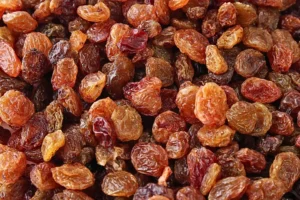
Description: Made from flame seedless red grapes, often sun-dried.
Color: Deep red
Flavor: Sweet and tart
Common Use: Used in salads, trail mixes
Benefits:
- Good source of potassium
- Supports muscle function
- Enhances blood flow
5. Currants
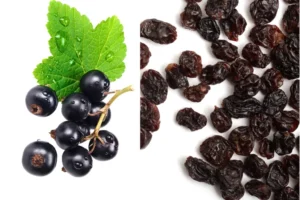
Description: Tiny, dried, seedless black Corinth grapes
Color: Dark purple to black
Flavor: Intensely sweet and tangy
Common Use: Scones, cookies, muffins
Benefits:
- Antioxidant-rich
- Boosts energy
- Improves metabolism
6. Sultanas
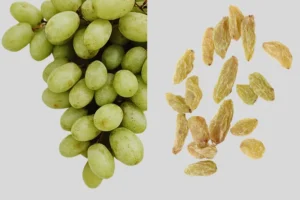
Description: These are made from Thompson seedless grapes and treated with sulfur dioxide. They’re popular in Europe and Australia.
Color: Light brown to golden
Flavor: Very sweet, moist, and plump
Common Use: Baked goods, puddings
Benefits:
- High in iron
- Good for blood circulation
- Promotes brain health
3. Nutritional Value of Raisins (per 100g)
- Calories: 299
- Carbohydrates: 79g
- Sugars: 59g
- Dietary Fiber: 3.7g
- Protein: 3.1g
- Fat: 0.5g
- Iron: 1.9mg
- Calcium: 50mg
- Potassium: 749mg
- Vitamin C: 2.3mg
Raisins are nutrient-dense and provide a quick energy boost.
4. Health Benefits of Raisins
1. Improve Digestion
Raisins are high in fiber, which helps with bowel regularity and prevents constipation.
2. Boost Iron Levels
Raisins are a good plant-based source of iron, essential for producing red blood cells.
3. Support Heart Health
Their potassium content helps regulate blood pressure and reduces the risk of stroke.
4. Aid in Weight Management
Due to their fiber and natural sugar, they help curb appetite and prevent overeating.
5. Enhance Skin Health
Antioxidants in raisins combat skin aging and keep the skin healthy.
6. Strengthen Bones
Raisins contain calcium and boron, both essential for bone strength and preventing osteoporosis.
7. Support Eye Health
The polyphenolic phytonutrients in raisins help maintain good vision and protect the eyes from free radical damage.
5. Which Type of Raisin Is Best?
The “best” raisin depends on your specific health goals:
- For heart health: Black raisins (rich in antioxidants)
- For digestion: Green raisins (more fiber content)
- For skin health: Golden raisins (flavonoid-rich)
- For iron deficiency: Sultanas and black raisins
- For taste and general use: Golden and sultanas
Overall Best for Health: Black raisins tend to be the most nutrient-rich and beneficial for general health due to their antioxidant content.
6. Recommended Daily Intake of Raisins
While raisins are healthy, moderation is key due to their high sugar content.
Adults:
- Ideal Intake: 30–40 grams (approx. a small handful or 1/4 cup)
- Maximum Limit: Up to 60 grams, especially for active individuals
Children:
Ideal Intake: 15–20 grams
Too much can lead to sugar overload, weight gain, or gastrointestinal discomfort.
7. How to Include Raisins in Your Diet
- Morning detox: Soak 8–10 black raisins overnight and eat them on an empty stomach
- In breakfast: Add to oatmeal, yogurt, or smoothies
- Snacks: Mix with nuts for a trail mix
- Cooking: Use in pulao, biryani, or curries
- Desserts: Include in cakes, cookies, or homemade energy bars
- Baking: Use sultanas or golden raisins for sweet breads
8. Side Effects of Overeating Raisins
Although healthy, excessive consumption can cause:
- Weight Gain: Due to high natural sugar and calories
- High Blood Sugar: Especially in diabetic individuals
- Digestive Issues: Like bloating or gas due to fiber
- Dental Problems: Sugar can contribute to cavities if oral hygiene is poor
- Allergic Reactions: Rare, but possible in some people
Tip: Always rinse raisins before use to remove any residue or sulfur dioxide.
9. Conclusion
Raisins are small but powerful dried fruits that offer a multitude of health benefits. From black and green to golden and sultanas, each type comes with unique advantages. Whether you’re looking to boost your iron levels, improve digestion, or simply enjoy a tasty snack, there’s a raisin for you.
Remember: Moderation is key. Just a handful a day can enhance your diet significantly without leading to excess sugar intake. For overall health, black raisins are an excellent daily choice, while golden or green raisins can be used for variety and specific benefits.

